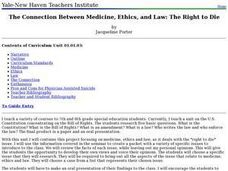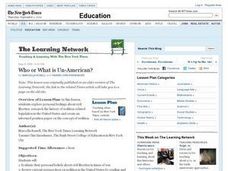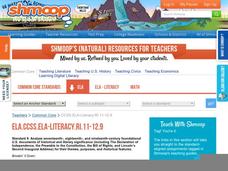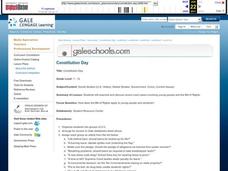ResourcesWeb & Docs
MediaVideo & Audio
CollectionsLessons & Topics
AI Teacher ToolsInstruction & Ideas
newFilter
1,615 results:
constitution of the u.s.Clear All
Curated OER
Gun Control and Terrorism: Laws or Loopholes?
High schoolers examine the Second Amendment of the Constitution. They research and organize key arguments and other fundementals of gun control. They participate in a debate defending the wording of the Second Amendment.
Curated OER
Thomas Jefferson on the Sedition Act
Students research and cite arguments Jefferson used in objecting to the Sedition Act. They discuss Jefferson's opinion on how constitutional questions about the Sedition Act could be resolved.
Curated OER
Can I Have a Jury Trial?
High schoolers examine the difference between a jury trial and a bench trial. They discuss any protections that the Indiana and United States Constitution offers its citizens. They use the internet to research any current press of jury...
Curated OER
The Connection Between Medicine, Ethics, and Law: The Right to Die
Students in a special education class examine the United States Constitution. Using the text, they answer five research questions and discuss the amendments that concern medicine, ethics and law of the right to die issue. They develop...
Curated OER
The 1808 Slave Trade Abolition Deadline
Students study the trans-Atlantic Slave trade. In this slave trade lesson, students study the Constitutional Convention Notes and the impact on United States slavery. Students research the slave trade database and other primary sources...
Curated OER
Racism, Discrimination, and the Law
Seventh graders examine the various racism and discrimination faced by various ethnic groups in the United States. In groups, they research the legal system and describe the purpose of the United States Constitution. They review cases...
Curated OER
The United States Flag
Students discover the meaning and symbolism behind the American flag. In this lesson on National symbols, students design a flag for their school, explain the symbolism they used, and distinguish the elements that constitute the US Flag....
Curated OER
Learning to Respect Each Other
Discover how important Martin Luther King Jr. is to our society. In this civil rights lesson, investigate how Dr. King was an advocate for nonviolence and how he fought for civil rights for all Americans. Read and analyze Dr. King's "I...
National Endowment for the Humanities
Slavery and the American Founding: The "Inconsistency Not to Be Excused"
High schoolers examine slavery in the revolutionary and colonial eras of the United States. For this slavery lesson, high schoolers investigate the presence of slavery in early America, the language of the Constitution, and the intent of...
Curated OER
Uniform Blues
Fourth graders explore what the U.S. Constitution is and why it is important, the purpose of the state constitution, and its relationship to the U.S. Constitution and the similarities and differences among federal, state and local...
Curated OER
America Influenced by the Enlightenment
In this influence of the Enlightenment on America study guide worksheet, young scholars read the notes provided and add notes of their own regarding the frameworks for the Declaration of Independence and U.S. Constitution.
Curated OER
Working in the World
Tenth graders read a selection of "Behind the Scenes" and other websites. They use a list of characteristics of effective citizens in the U.S. to identify characteristics represented in the work, "Elizabeth Keckley: Mrs. Lincoln's...
Curated OER
So You Want to Be President?
Learners view a documentary on U.S. Presidents. Those called to serve be remembered by future generations that study American and world history. After viewing, students discuss what they saw then create a poster about the electoral process.
Curated OER
Who or What is Un-American?
Students explore concepts about civil liberties, research the history of sedition-related legislation in the U.S. and create a position paper on the topic.
Curated OER
State Symbols
Third graders examine the symbolism of the United States by observing different flags. In this U.S. History lesson, 3rd graders utilize the Internet to research state seals, flags, and other symbols that represent specific areas of...
iCivics
For The President, All In A Day's Work
How does the president of the United States get the authority to exercise his/her duties? What responsibilities and tasks go into a hard day's work for the president? Here is a lesson plan that includes several instructional materials...
NPR
Same-Sex Marriage
The battle over same-sex marriage is a prevalent issue in the United States, and a valuable topic to be discussed in your social studies classroom. Here is a basic outline of introductory questions, focus questions, vocabulary, and media...
Shmoop
ELA.CCSS.ELA-Literacy.RI.11-12.9
Guided by close-reading questions, groups examine the similarities and differences between the Declaration of Independence and the Bill of Rights. In addition, they look at how the principles are presented in these two foundational US...
Curated OER
Religion in the Schools
The requirements of the Equal Access Act are studied and applied to factual situations. By looking at the particular contexts suggested your class can examine the difficulties faced by administrators in whether they should permit...
Curated OER
Bill of Right in Action
Groups reserach and write about topics given to them by their teacher dealing with the Bill of Rights.
Curated OER
Do Suspected Enemies Have Rights?
Students investigate the history of Japanese immigration. They complete an online Webquest, explore various websites, answer discussion questions, and locate and read newspaper articles about enemy compatants.
Curated OER
Right of Privacy: 4th Amendment
Students are introduced to the 4th Amendment of the Washington state Constitution. In groups, they examine the Constitution of the state of Washington and compare it to the United States Constitution. They role play the role Supreme...
Curated OER
Constitution Day
Students examine and discuss recent court cases involving young people and the Bill of Rights.They use a focus question to create the context for class discussion: How does the Bill of Rights apply to young people and students?
Curated OER
Due Process
Students understand the legal term "due process of law" and its historical origins. They discuss the requirements for "due process of law" in both the U. S. Constitution and the Indiana Constitution and how those rights are similar or...

























